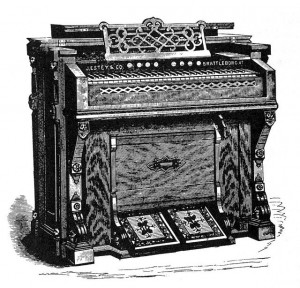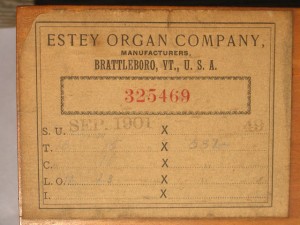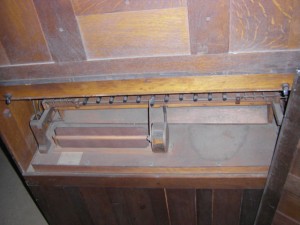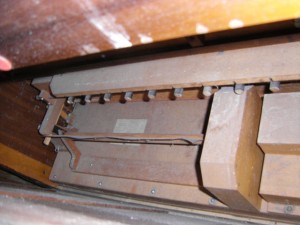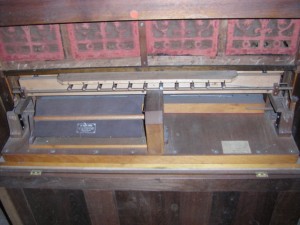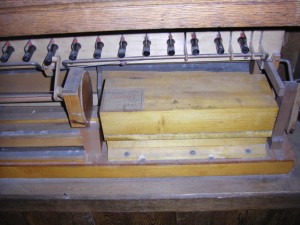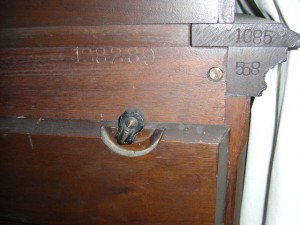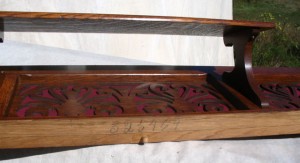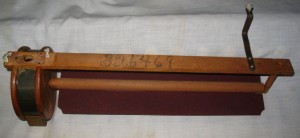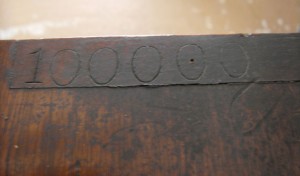J. Estey & Co. (1864-c.1882) and Estey Organ Co. (c.1882-c.1955) made numerous types and styles of reed organs, including
Each Estey reed organ was assigned a unique serial number.
Look Inside
To search for a serial number, lift the top of the organ case, if it is hinged. If the top is not hinged, remove the back board, which is held on with cast iron catches or screws.
Paper Label
The serial number is printed on a paper label glued to the upper surface of the chest. Figure 2 shows a typical Estey label with serial number 325469 printed in red in the space provided.
Note that Estey serial numbers do not include a comma.
The label in Figure 2 traces the manufacturing of Estey Organ Serial Number 325469.
- The organ was set up during Sept. 1901 by Estey employee # 49.
- The reeds were tuned in the organ 10-15-1901.
- The tuning was corrected 10-16-1901.
- The tuning and organ were looked over 12-23-1901 by employee # 532.
- This newly-completed chapel organ was ready to be delivered to a church in time for Christmas 1901.
J. Estey & Co. Cottage Organ labels may have the year faintly penciled in the upper right corner.
Locating the Label
Paper labels on Estey reed organs are typically located:
- On the treble side of chest (Figure 3)
- On the chest behind the tremolo (Figure 4)
- On bass side of the chest (Figure 5)
If there is a sub bass box, the label may be located on top of it, as in Figures 6.
Labels in chapel organs and two-manual with pedal instruments may be high up, such as on top of the sub bass or pedal box, or on the swell chest.
No Paper Label
If the paper label is missing, you may be able to find the serial number elsewhere on the instrument.
On the Warrantee
The serial number may be printed on the warrantee, which may be tacked to the inside of the case.
On the Top Rail
The serial number may also be stamped into the back top rail.
Figure 7 shows serial number 128289 stamped into the back top rail of an Estey parlor organ.
IMPORTANT NOTE: In Figure 7, the 3-digit and 4-digit numbers stamped into the top rail are not serial numbers. The serial number has 5 or 6 digits.
HINT: If you see only 3- and 4-digit numbers stamped into the back of the top rail, the serial number may be stamped into the top edge of the top rail. It may be necessary to move the high top to see the top edge of the top rail.
On Other Parts
The serial number may be written in pencil or chalk on various case or action parts, as in Figures 8 and 9.
Helpful Hints
When searching for a serial number on an Estey reed organ:
- You may need to shine a light from various angles to better see writing on labels or parts.
- Illegible labels may be cleaned with a dry, soft brush.
- Be careful: Paper labels are fragile. The ink and pencil marks come off easily.
An Historic Holding
Figure 10 shows serial number 100000 stamped into the top edge of the back top rail of this Estey Salon Organ.
This historic organ, which marked an Estey milestone, was built in 1880 and is on exhibit at the Estey Organ Museum.
Source: Ned Phoenix

